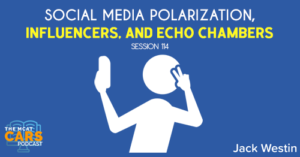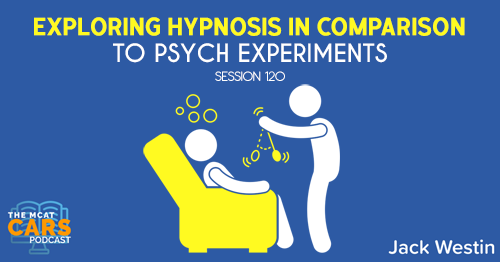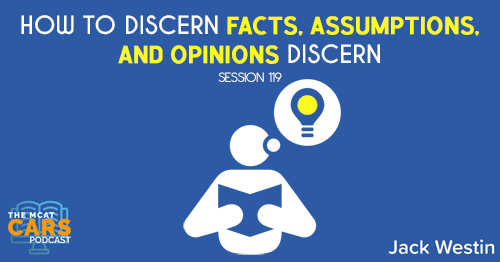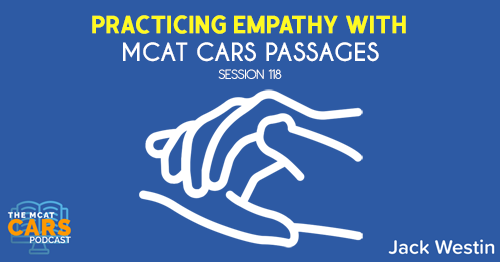Apple Podcasts | Google Podcasts
Session 114
We all think of the world in specific ways. However, success in CARS requires you to keep an open mind. Leave your biases at the door and question everything.
As always, I’m joined by Jack Westin from JackWestin.com. Check out all their amazing free resources including a free trial session of Jack’s full course to see how it’s like learning from Jack Westin himself.
Listen to this podcast episode with the player above, or keep reading for the highlights and takeaway points.
Link to the article:
Every time I log onto Facebook, I brace myself. My newsfeed—like everyone else’s I know—is filled with friends, relatives and acquaintances arguing about COVID-19, masks and Trump. Facebook has become a battleground among partisan “echo chambers.” But what is it about social media that makes people so polarized?
To find out, my colleagues and I ran a social media experiment in which we divided Democrats and Republicans into “echo chambers,” or small groups whose members affiliate with just one political party. Next, we picked the most polarizing issues we could think of: immigration, gun control and unemployment. We asked each participant what they thought of those issues, then let people talk to each other and revise their opinions. After several rounds of discussion and revision, we evaluated each group’s viewpoint.
To our surprise, the echo chambers did not make people more polarized, but less. After interacting in social networks with likeminded peers, each echo chamber—Republican and Democrat—had adopted a more moderate opinion. All groups independently moved toward opinions that were closer to the opinions on the “opposite” side of the political spectrum.
As a scientist who studies networks, I’m used to being surprised by the results of my experiments. Technology has allowed us to access more information and data about people’s social networks, debunking many of our assumptions about human behavior. But even my team at the Network Dynamics Group was surprised: Why did our social media experiment find the opposite of what happens all the time in the real world of social media?
The answer lies in something social media has amplified: “influencers.”
By now, most of us have a fairly specific understanding of what an “influencer” is. The word conjures up a young, wealthy person whose lifestyle is sponsored by brands like Instagram, TikTok or YouTube. But the word has a very specific network science meaning. In social media, networks tend to be centralized: a small number of people, or perhaps just one person, at the “center” of the network is connected to lots of other people in the “periphery.” The multitudes in the periphery of the social network have only a modest number of connections, while the few—the so-called “influencers”—at the center of the network are connected to nearly everyone. This puts these people into the powerful position of being able to exert a disproportionate level of “influence” over the group.
[01:49] Predictions Are Just Predictions
Jack wants to remind students that it’s very important not to be firm on their own biases and predictions. It’s good to have predictions, but just remember that at the end of the day, your predictions are just predictions. It’s not necessarily precise.
'When it comes to CARS, check your ego, all of your preconceived notions, and all of your knowledge at the door.'Click To TweetSome students have this issue where they’ll read a sentence, and they misinterpret it. And it’s most likely because they’re not paying attention to the text. They’re looking at the words and they’re skimming without realizing it. Then when they get to the end of the sentence, they just use their predictions. Jack says it’s actually harder to do that than just reading the sentence. That could happen because you may be reading too quickly and you may not be paying attention to every single word.
'Focus and discipline are key to doing well on this test.'Click To TweetEssentially, you have to focus and pay attention to every word. Have the discipline to follow through with your actions with whatever strategy you decide to use on this test. You can’t go into any question randomly and just look at things at different times. Rather, stick to a consistent way of reading questions and answering questions. And consistency is key.
[04:12] Paragraph 1, Sentence 1
Every time I log onto Facebook, I brace myself.
Jack says:
“Bracing myself” is a pretty common adage. But it basically is like a warning because it’s probably something bad. You brace yourself for something bad. So it definitely connotes negativity towards Facebook.
[05:07] Paragraph 1, Sentence 2
My newsfeed—like everyone else’s I know—is filled with friends, relatives, and acquaintances arguing about COVID-19, masks, and Trump.
Jack says:
This is sort of annoying to the author, or at least problematic to some extent. It’s not that clear and it’s not that obvious. But it’s not a bad prediction. It’s not a bad way of reading.
[05:46] Paragraph 1, Sentence 3
Facebook has become a battleground among partisan “echo chambers.”
Jack says:
The word “partisan” is typically not something that premeds use in their daily vocabulary. You may watch the news, and you may understand what bipartisan and partisan mean. But you don’t have to.
The term “echo chambers” is very interesting. Let’s try to visualize what it means. If you’re echoing within a chamber, you’re going to hear yourself. So you can assume that Facebook is filled with probably different groups of people that all say the same thing to one another. Because if you say one thing and you hear yourself back, it’s probably either someone else or yourself.
[07:01] Paragraph 1, Sentence 4
But what is it about social media that makes people so polarized?
Jack says:
“Polarized” could mean different things and could go down a couple of different routes. In this case, polarized probably means that you’re charged in one direction, whether positive or negative. There’s no clear opinion on who’s right or wrong.
But it seems like someone or some group of people are very opinionated towards their own agenda. They’re not really listening to the other side, or at least they’re not siding with the other side.
[08:17] Paragraph 2, Sentence 1
To find out, my colleagues and I ran a social media experiment in which we divided Democrats and Republicans into “echo chambers,” or small groups whose members affiliate with just one political party.
Jack says:
The author gave a little bit of definition for an echo chamber. It’s not hard to imagine this today because we’re pretty divided as a country. And it definitely does describe an echo chamber. Democrats in one group, and Republicans in another group.
They even said just one political party that’s the polarization. You’re just focused on one and that’s basically what partisan is. You’re partisan because you really want to focus on your own agenda or your own thing.
[09:14] Paragraph 2, Sentence 2
Next, we picked the most polarizing issues we could think of: immigration, gun control and unemployment.
Jack says:
This is some more discussion of the experiment set up and some of these polarizing topics.
[09:32] Paragraph 2, Sentence 3
We asked each participant what they thought of those issues, then let people talk to each other and revise their opinions.
Jack says:
Just more experiment setup here.
[09:45] Paragraph 2, Sentence 4
After several rounds of discussion and revision, we evaluated each group’s viewpoint.
Jack says:
Most students will try to guess. But that guess could harm you if you’re not paying attention and you would assume what’s going to happen if you put people in these “echo chambers.”
“It's very important not to confuse your prediction with the truth.”Click To TweetWe all think of the world in a very specific way. We don’t necessarily think of ourselves as being correct or incorrect. And that leads to biases. Biases can impact the way you answer these questions. So keep an open mind and assume you don’t know anything.
Be flexible. You can definitely predict because prediction will help you pay attention. This will keep a good guide for the rest of the paragraph in the passage. But be ready to amend your prediction at any time.
[11:36] Paragraph 3, Sentence 1
To our surprise, the echo chambers did not make people more polarized, but less.
Jack says:
How is that possible that you’re putting people who have the same opinion in a room and they have become less polarized? They have become more open to other people’s agendas and opinions outside of their own group.
This is something a lot of students cannot conceive or think about. And that’s okay because that’s not how we see things or believe things to be.
If you read the second paragraph with certainty and with this committed bias towards your own opinion, you may overlook this paragraph. You may start skimming it. Now, thankfully, this author was very clear. MCAT articles are not going to be like this. But in this case, they just went outright and said they become less polarized. That was nice of them, but don’t always expect that.
“MCAT articles usually use a contrast word or something in the middle of the paragraph to eventually go against what they said earlier.”Click To TweetWhen you’re studying science classes every day, the professor tells you one thing. Then you have to memorize it, study it, believe it, and you’re going to be tested on it. And then you jump into CARS, which is all about really debating everything you’re reading.
[14:33] Paragraph 2, Sentence 4
After interacting in social networks with likeminded peers, each echo chamber—Republican and Democrat—had adopted a more moderate opinion.
Jack says:
The author here is stating what they just said in the last sentence that they became less polarized.
[14:54] Paragraph 2, Sentence 5
All groups independently moved toward opinions that were closer to the opinions on the “opposite” side of the political spectrum.
Jack says:
At this stage, you may start to think that they messed up. Or maybe you start believing it. But then you’re thinking why they’re doing it. They haven’t explained why. So we can’t bring in our own opinions yet as to why.
[15:28] Paragraph 4, Sentence 1
As a scientist who studies networks, I’m used to being surprised by the results of my experiments.
Jack says:
This scientist just basically said that he’s terrible at setting up experiments because he’s always surprised by the results. When we experiment, we don’t know the outcome. We have a guess or a prediction or hypothesis, but we have no idea about the outcome.
[16:04] Paragraph 4, Sentence 2
Technology has allowed us to access more information and data about people’s social networks, debunking many of our assumptions about human behavior.
Jack says:
The author here is leaning into data and how they can learn more about human behavior. It’s debunking many of our assumptions. So we end up being wrong a lot of the times and technology helps us get there.
[16:34] Paragraph 4, Sentence 3
But even my team at the Network Dynamics Group was surprised: Why did our social media experiment find the opposite of what happens all the time in the real world of social media?
Jack says:
Maybe your interpretation of the real world is not the same or is not correct. These are people and they may say things the wrong way.
'If it's written in a book, everyone thinks it's correct, and that's not true.'Click To TweetJust because someone published something does not mean they’re smarter. It just means they were more passionate about it and had some sort of agenda. But it doesn’t mean they’re an authority. So questioning everything you read is super important.
[18:48] Paragraph 5, Sentence 1
The answer lies in something social media has amplified: “influencers.”
Jack says:
Notice how it’s a standalone sentence/paragraph. It’s very impactful when you do that as an author because you’re making it seem like it’s a big deal by making it standalone. And it’s rightfully done.
The whole two paragraphs before this were all about why. So this helps garner attention. It allows you to keep reading with interest. And now, they’ve answered it. This is an argument as to why this is happening. It has something to do with influencers who happen to amplify whatever social media is.
[19:55] Paragraph 6, Sentence 1
By now, most of us have a fairly specific understanding of what an “influencer” is.
Jack says:
Social media has amplified these influencers so we see more influencers.
[20:13] Paragraph 6, Sentence 2
The word conjures up a young, wealthy person whose lifestyle is sponsored by brands like Instagram, TikTok or YouTube.
Jack says:
The author is just explaining what an influencer is.
[20:25] Paragraph 6, Sentence 3
But the word has a very specific network science meaning. In social media, networks tend to be centralized: a small number of people, or perhaps just one person, at the “center” of the network is connected to lots of other people in the “periphery.”
Jack says:
The author is talking about their technical definition of influencers being in the center of this network of people.
[21:07] Paragraph 6, Sentence 4
The multitudes in the periphery of the social network have only a modest number of connections, while the few—the so-called “influencers”—at the center of the network are connected to nearly everyone.
Jack says:
It sounds like they’re setting up the echo chambers around these influencers because they’re the center and they’re connected to everyone.
[21:43] Paragraph 6, Sentence 5
This puts these people into the powerful position of being able to exert a disproportionate level of “influence” over the group.
Jack says:
It seems like the influencer is the one creating this echo chamber and is impacting people in a polarized way. And then, you don’t have that within these groups of people who just have political opinions. And that’s at least how they interpret the result.
[22:38] Main Idea
Now, there could be many other reasons as to why this happened. Maybe it has nothing to do with influencers. But at least, that’s how the author paints it here.
It seems like people who are very popular or who have a big influence on others are the culprit for these polarized opinions.
Based on how the author describes it, it seems like they’re probably not a fan of polarized views. It’s not obvious but you could probably guess that’s where it’s going.
Ultimately, some influencers do good and they promote happiness, charity, and positivity. But we have to be careful which influencers we give power to.
Links:
Link to the article:
SEARCH SITE
SEARCH SITE
LISTEN FOR FREE












